June 11, 2025 | 15:50 GMT +7
June 11, 2025 | 15:50 GMT +7
Hotline: 0913.378.918
June 11, 2025 | 15:50 GMT +7
Hotline: 0913.378.918
The pig farming industry plays a pivotal role in the food supply chain. Experts emphasize that restructuring the industry through input cost control, strengthened linkages, and technology application is the key to maintaining production efficiency, enhancing competitiveness, and expanding opportunities to conquer international markets.
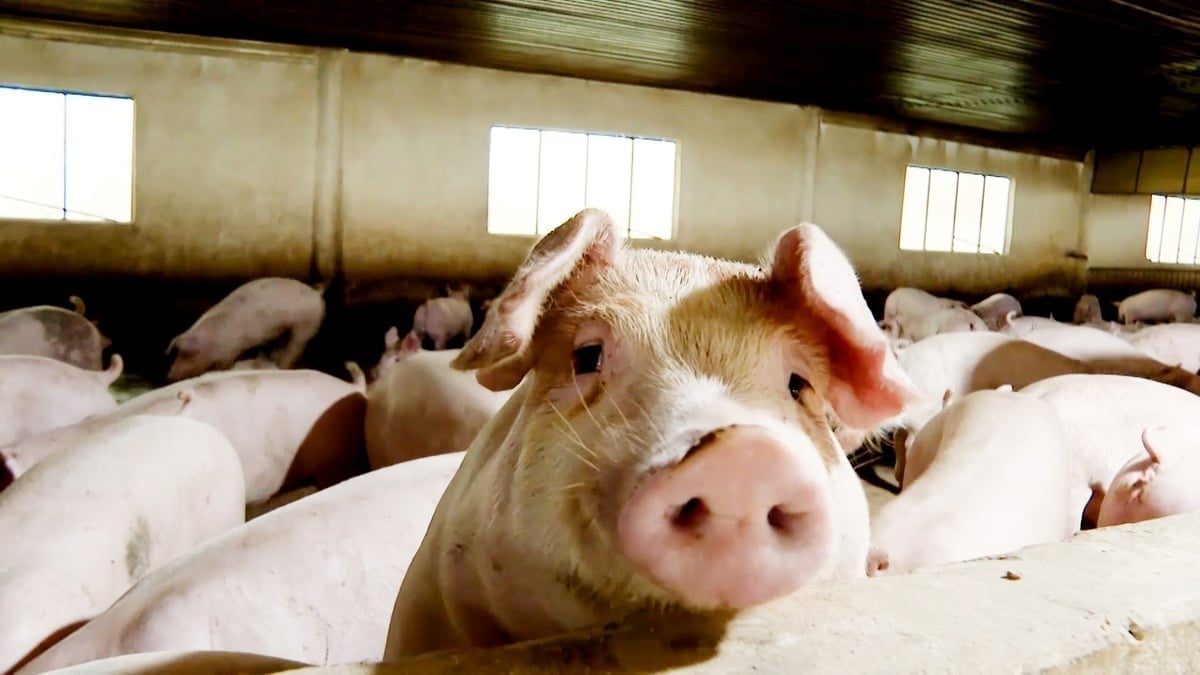
The pig farming industry plays a pivotal role in the food supply chain and is one of Vietnam's most promising export sectors. Photo: Minh Sang.
Speaking at the Pig Industry Trade Promotion Forum, within the framework of the 1st National Conference on Pig Sciences & Technologies (PST2025) held at the Branch of Vietnam National University of Forestry at Dong Nai, Mr. Dang Hoang Lam, Deputy Director of Megavet Vietnam Veterinary JSC, shared that Megavet is collaborating with partners to implement smart technology systems integrated with artificial intelligence (AI) in semen production, insemination, and pig breed selection.
These systems enable accurate semen quality assessment and ultrasound scanning, and support effective breeding, thereby improving reproductive performance and the quality of commercial pork. Notably, the AI-integrated ultrasound software enables the screening of superior breeds directly on farms or via the remote image analysis center.
“We have coordinated with Vietnam National University of Agriculture to establish a Technology Transfer Training Center, fully equipped with modern devices to train technicians, students, and livestock farmers in accessing new technologies. The company has also conducted many training courses for major corporations and partners nationwide,” Mr. Lam shared.
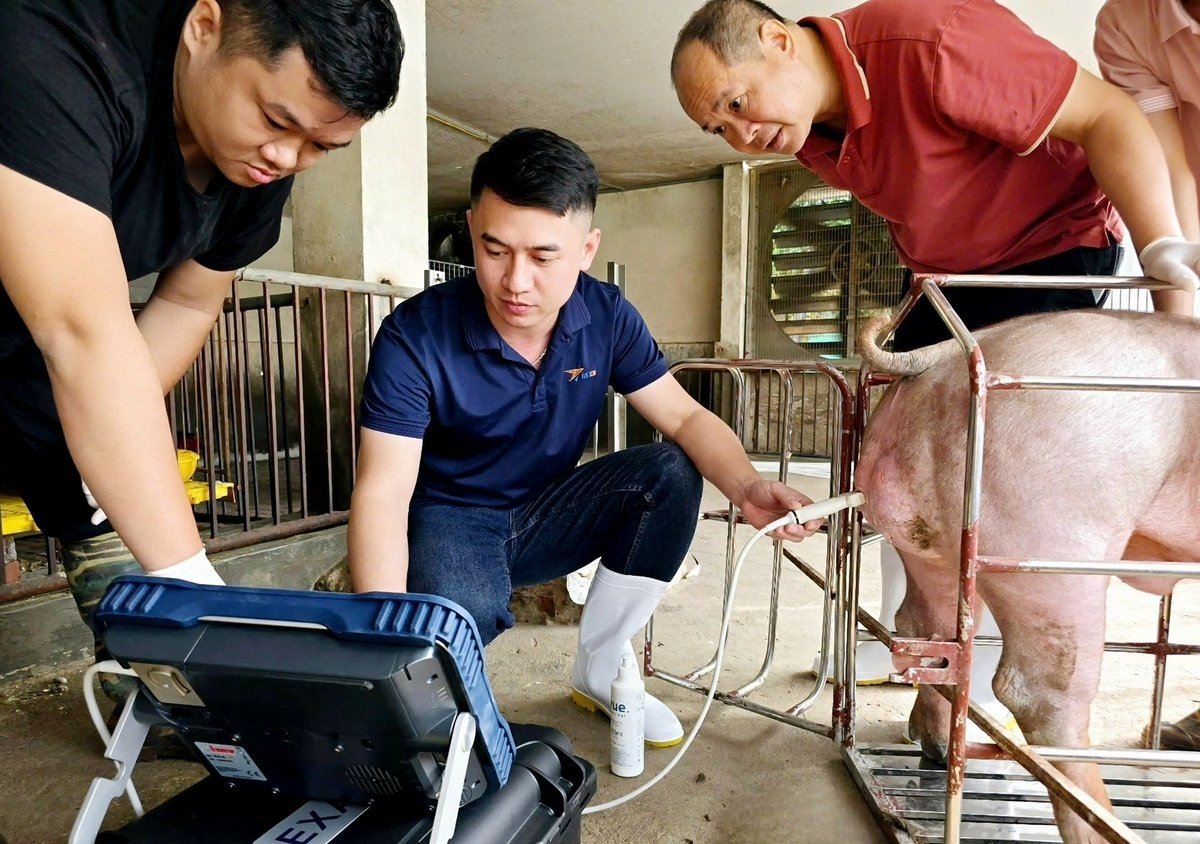
Apply smart technology systems integrated with artificial intelligence (AI) in semen production, insemination, and pig breed selection. Photo: Minh Sang.
Mr. Nguyen Van Hoa, Chairman of the Board of Directors at Viet Thai Group Agriculture JSC, introduced a new breed of black pigs developed through crossbreeding between domestic and international genetic sources, with scientific support from experts at the Institute of Animal Sciences for Southern Vietnam (National Institute of Animal Science). This breed has received high appreciation from experts for its distinctive aroma, tender meat, and sweet fat quality.
According to Mr. Hoa, developing a circular and green livestock ecosystem brings more sustainable value to businesses, in which livestock production in general and pig farming in particular must be integrated with other key crops.
Regarding nutritional solutions aimed at achieving net-zero emissions, Ms. Nguyen Thi Phuong Thao, Director of Trade Promotion at Japfa Comfeed Vietnam Co., Ltd., shared that the company has developed a range of low-protein products with a balanced amino acid profile. These products are designed to reduce nitrogen excretion into the environment and decrease feed costs, which account for the largest proportion of expenses in livestock production, without affecting productivity or meat quality. In addition, the company promotes nutritional supplementation solutions that replace antibiotics and enhance animal health, with a focus on environmental friendliness and food safety.
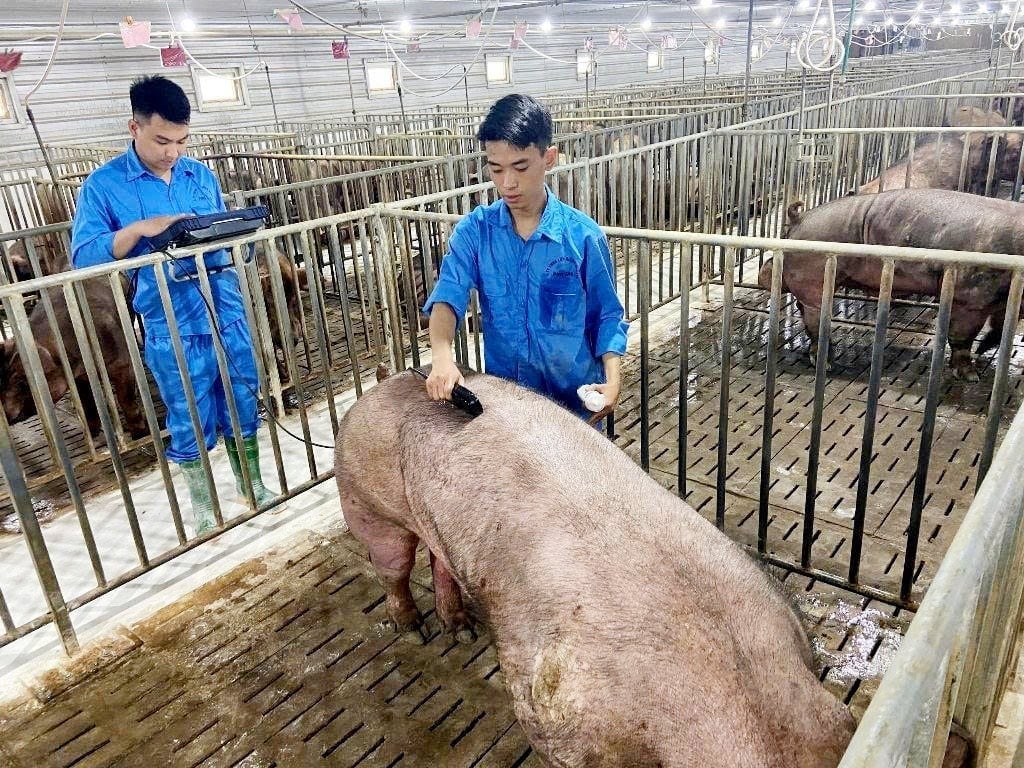
Using an AI-integrated ultrasound machine to evaluate carcass and meat quality in pig breeds. Photo: Minh Sang.
Vietnam's livestock industry has made significant steps forward in productivity, breed quality, nutrition, and modern barn systems. However, Mr. Ngo Quoc Cuong, General Director of R.E.P Biotech JSC, stated that the major gap in biosafety control remains a key factor contributing to the increased risk of diseases, particularly African swine fever (ASF).
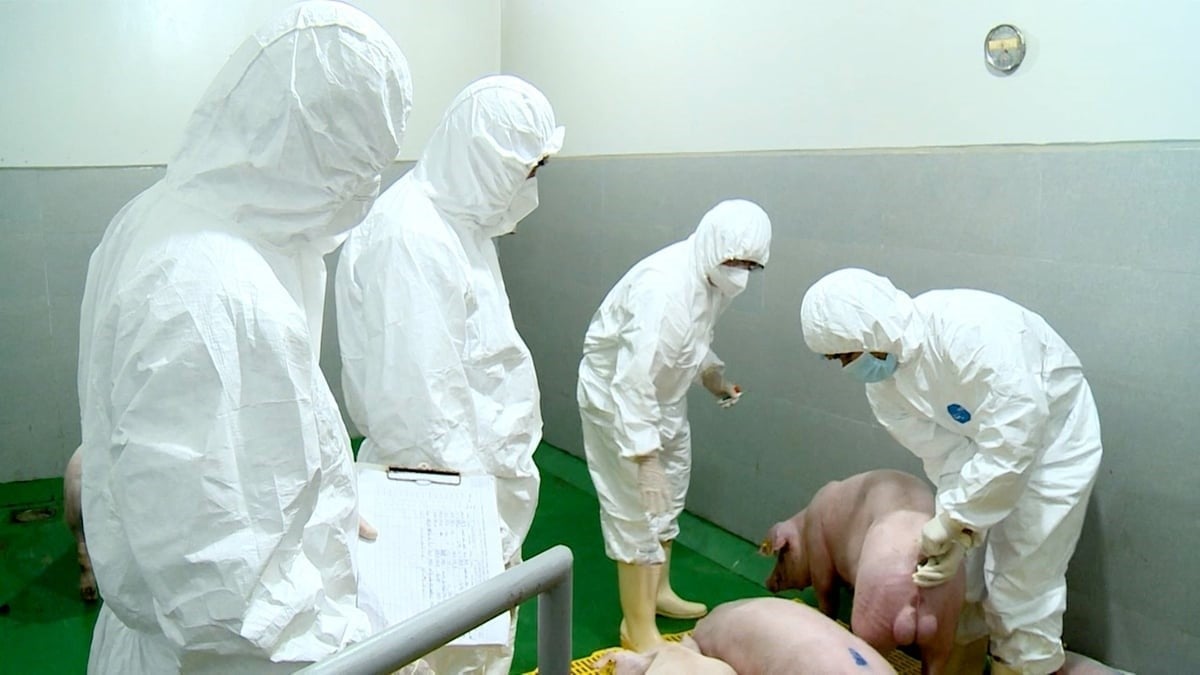
Vietnam's livestock industry has made significant steps forward in productivity and breed quality, but the major gap in biosafety control remains a key factor contributing to the increased risk of diseases, particularly African swine fever (ASF). Photo: Minh Sang.
ASF has caused severe damage to Vietnam's pig farming industry over the years. Despite the implementation of numerous disease prevention measures, such as vaccination, enhanced biosafety, and biological farming methods, disease outbreaks continue to occur, with increasing severity. Recently, ASF has continued to spread widely, resulting in substantial losses to pig herds nationwide and driving a sharp rise in live pig prices, especially since the Lunar New Year.
To manage diseases, reduce antibiotic use, and enhance the quality and value of animal products, R.E.P. Biotech established the Research–Analysis–Testing–Screening Center in 2022. The center provides biotechnology solutions to strengthen natural immunity for livestock. The integration of immunology and biotechnology, combined with reduced antibiotic use, is expected to help the livestock industry mitigate diseases and achieve more sustainable development in the long term.
Dr. Do Vo Anh Khoa, Senior Advisor at the Branch of the Vietnam National University of Forestry and Head of the Vietnam Pig Industry Club, emphasized, “Biosafety must be elevated to a higher level of ‘biosecurity,’ as its impact extends across regions and countries. Moreover, each outbreak causes significant social disruption, including the handling and transport of sick/dead pigs and consumer psychology.”
According to Mr. Khoa, ASF vaccines are now of significant value, especially for pig breed herds. However, the commercialization process still faces many barriers. Among them, the core issue lies in providing comprehensive scientific evidence on the vaccine’s efficiency and safety in both trials and practical production.
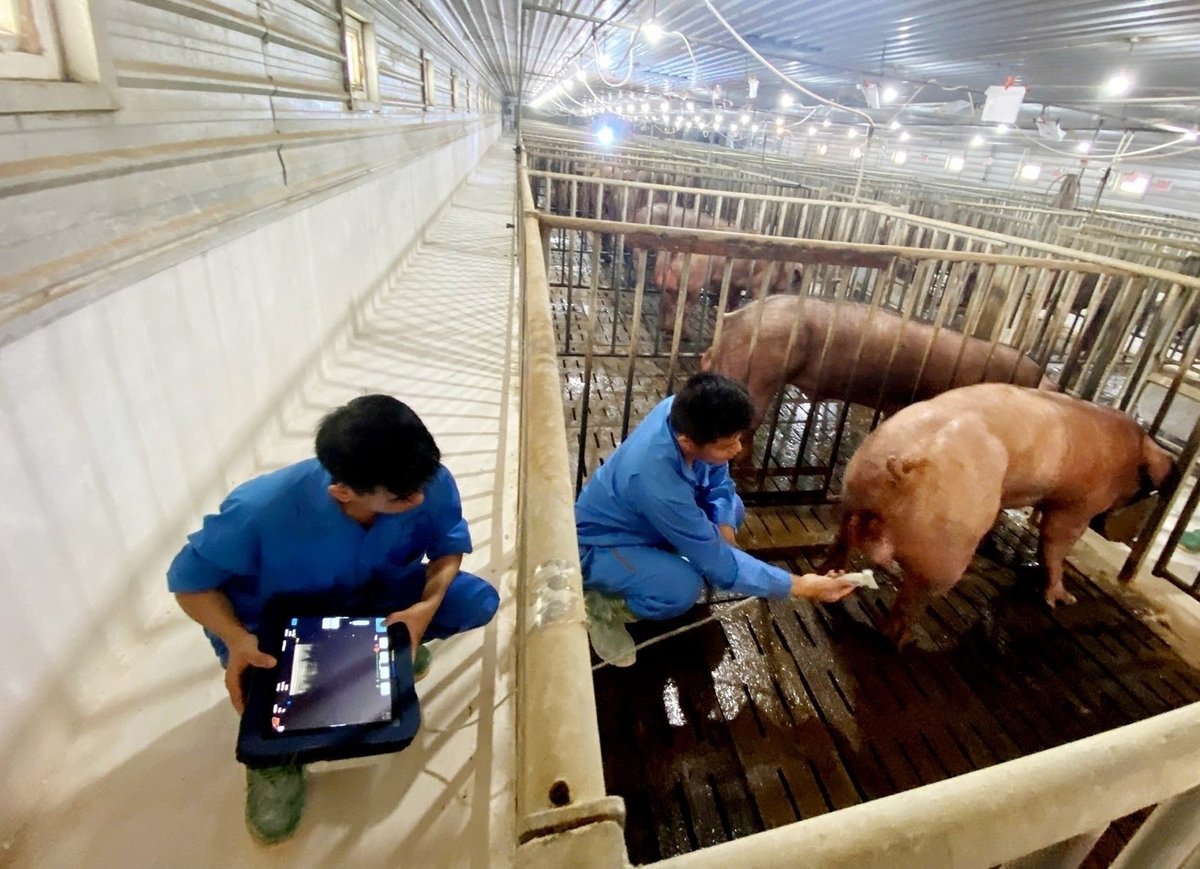
AI-integrated ultrasound machine used to evaluate early-stage boar productivity (from 23 to 26 weeks old). Photo: Minh Sang.
Dr. Mai Hai Chau, Deputy Director of the Vietnam National University of Agriculture at Dong Nai, affirmed, “With around 2 million pigs, accounting for 7.5% of the national herd, Dong Nai is currently the largest livestock hub in the country, creating jobs for 30,000 workers across 1,300 large-scale farms and 1,000 satellite farms. However, the pig farming industry still faces major challenges related to diseases, planning, the environment, and weak chain linkages, all of which hinder sustainable development.”
According to Dr. Chau, linkages between scientific research, technology transfer, and trade promotion are key to enhancing the added value and competitiveness of Vietnam’s pig industry in the context of deep international integration.
Under the message “For a healthy pig industry,” experts hope to promote a new development mindset in which livestock farming not only focuses on increasing productivity but also aims to protect the environment, control diseases, ensure biosafety, and improve the livelihoods of farmers.
For the pig farming industry to sustainably develop in the digital era, it is essential to innovate technologies and production processes, especially to upgrade human capacity and awareness throughout the value chain. Strong coordination among science, production, services, governance, and markets is the decisive factor. In the context of global competition, it is mandatory to proactively respond to diseases, increase productivity, and build strong brands based on scientific foundations, developed through technology and oriented toward transparency and sustainability,” said Dr. Do Vo Anh Khoa.
Translated by Thu Huyen

(VAN) Vietnam considers participating in ALGROALBA in order to expand agricultural production, coordinate the assessment and effective exploitation potential land.
/2025/06/05/5314-1-184727_407.jpg)
(VAN) From seemingly worthless fish scales and skin, enzymes and lactic ferments can transform by-products into peptides, opening a sustainable, effective business direction and elevating Vietnamese seafood.

(VAN) TTC AgriS and IFC signed a strategic partnership to develop a sustainable agricultural value chain, aiming to achieve the Net Zero target by 2035.

(VAN) Seafood by-products are opening a new path, combining green growth and technological innovation to enhance the industry's value.

(VAN) Mr. Nguyen Thanh Cong, Vice Chairman of the Son La Provincial People's Committee, reflects on Son La’s journey from barren hills to fruitful orchards after a decade of hard work.

(VAN) FAO’s Director-General addresses the 5th Baghdad International Water Conference.